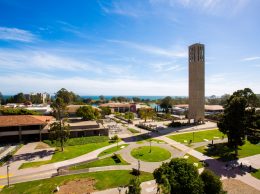Electrical engineer’s death may be linked to GaN work at UCSB

Singapore police have asked the FBI to join their investigation into the death of Shane Todd, a promising young scientist who received his Ph.D. in electrical engineering from UC Santa Barbara.
The death initially was ruled a suicide but a growing number of people think he may have been murdered.
FBI involvement represents a small but perhaps crucial breakthrough for a grassroots effort by UCSB College of Engineering professors John Bowers and Robert York.
York and Bowers, who was Todd’s advisor, are among a growing number of experts who think Todd’s death may be linked to his work on gallium nitride, or GaN, an advanced semi-conductor material that could be key to building smaller, more efficient devices, whether they are for lighting or signal jamming.
Todd was one of a very small number of scientists who understood the potential of gallium nitride or GaN, and reporting by the Financial Times shows he was troubled about the potential for his research to compromise U.S. national security in recent months.
As reported by writers Raymond Bonner and Christine Spolar in the Feb. 15 edition of the FT, Todd’s body was found hanging in his Singapore apartment in June, just a few days before he was to return from Asia and take a new job in the U.S. His family said that while he talked about stress and anxiety before he died, he did not seem depressed. Evidence in his apartment didn’t match accounts of his suicide, and photos of his body indicated injuries that might have come from a struggle, not suicide.
What has York and others deeply troubled is the possibility that Todd’s GaN research might have been passed along to Chinese telecom giant Huawei via a joint venture with an advanced Singapore government research center called the Institute of Microelectronics, or IME, where Todd was employed.
York told the FT that such a development would be “unnerving but not surprising.” He told me via email that he views the death as “suspicious” and added this chilling caution: “It certainly will make me think twice about recommending that any of our American students consider advanced research positions in that part of the world.”
For its part, a Huawei spokesperson told the BBC the company “does not do military equipment or technology” and IME officials said that while they discussed a partnership with Huawei, nothing formal was developed.
Todd’s death has drawn worldwide media attention because after his death, the family traveled to Singapore and found a hard drive in his apartment that contained a trove of files about an IME-Huawei project to co-develop an advanced amplifier using GaN technology.
The Singapore police initially refused to invite the FBI to join the investigation, but when the Todd family refused to turn over the hard drive, Singapore requested help. Still under way is a separate citizen’s effort to get the Department of Justice to intervene on behalf of the Todd family. Those interested in supporting DOJ intervention can join the petition at petitions.whitehouse.gov.
UCSB is one of just a few centers around the world pursuing research into GaN, one of the most promising semiconductor materials around. So promising is GaN’s potential to save energy and increase the efficiency of electrical devices that halfway around the world from the Singapore apartment where Todd was found dead, GaN pioneer Umesh Mishra, CEO and co-founder of Goleta-based Transphorm was being feted as an energy pioneer at the annual IHS/CERA Energy summit in Houston.
If Todd’s death is found to be something other than a suicide, then how far the investigation progresses into what really happened is anybody’s guess. It partly depends on how closely the media follows the story and it partly depends on how far the Singapore police might be willing to go to take on an institution such as IME or a telecom giant such as Huawei. Australia won’t allow Huawei to supply its broadband effort and the U.S. House of
Representatives has recommended not using its components, over howls of protest by Huawei and its rival, ZTE. Media coverage remains the key, said York. “One wonders whether the FBI would be involved now were it not for the publicity,” he wrote in an email.
• Contact Editor Henry Dubroff at [email protected].











